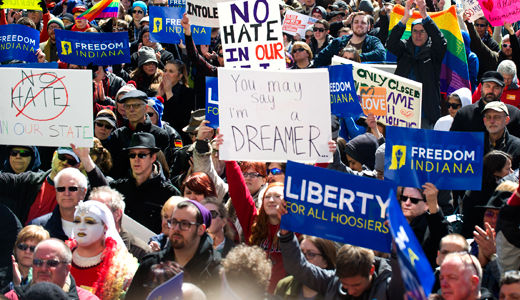
The public workers union, AFSCME, announced March 30 it will move its is 2015 Women’s Conference, scheduled for October, out of Indianapolis “as a direct result of Gov. Mike Pence last week signing into law a bill that legalizes discrimination.” The 1.6 million member union said in the media statement, “[It] cannot in good conscience make such a sizeable financial investment in Indiana knowing that women and men in that state are deliberately being targeted for discrimination.”
Calling the highly controversial law “un-American” and an “embarrassment,” the union says the law allows businesses to refuse service to gay and lesbian customers. “It sets Indiana and our nation back decades in the struggle for civil rights. It is an embarrassment and cannot be tolerated.” The union said its action to relocate the conference is “a sign of our disgust and disappointment” with the governor and the law.
Indiana made national news when Pence signed the so-called Religious Freedom Restoration Act, March 26, drawing condemnation and outrage from Hoosiers and non-Hoosiers alike. Although there are other RFRA laws on 20 states’ books and a federal law, the Indiana law is different because it allows individuals, private businesses and corporations to discriminate against LGBT Americans (or anybody else) based on their “religious beliefs.” The law dovetails the infamous Hobby Lobby Supreme Court decision that granted corporations the right to refuse to offer birth control to its employees based on religious reasons.
Celebrities, companies and colleges responded swiftly to the new law. Salesforce.com banned employee travel to the state while the Yelp, a popular review website, pledged not to expand into the Hoosier state. The NCAA president said the law could lead to major changes in the college sports governing body’s relationship to the state where Indianapolis is the site for the Final Four basketball semi-finals and championship game this year. Jason Collins, the NBA’s first openly gay player, asked the governor in a tweet three days before Pence signed the bill, “@GovPenceIN, is it going to be legal for someone to discriminate against me & others when we come to the #FinalFour?”
Pence, clearly on the defensive during the Sunday morning news talk shows, claimed the Indiana law is similar to 19 other states that have so-called religious freedom laws, most passed two decades ago.
But in an analysis by Think Progress’ Judd Legum, he writes such a claim “is simply not true” and warns that other states “are following Indiana’s lead and broadening the language” of the older laws in significant ways.
“When the federal law was signed in 1993, it was thought ‘to be about benign and relatively uncontroversial matters, such as allowing Muslim jail inmates to wear closely trimmed beards, or assuring that churches could feed homeless people in public parks,'” he writes. “Today, Indiana’s law is driven ‘by the politics of anti-gay backlash. Their most ardent supporters come from an increasingly angry, marginalized, and shrill subset of Christian conservative activists.'” The recent legal and political victories on marriage equality and interrelated sea change of public opinion are case in point.
Thirty law professors who are experts in religious freedom wrote in February that the Indiana law does not “mirror the language of the federal RFRA” and “will… create confusion, conflict, and a wave of litigation that will threaten the clarity of religious liberty rights in Indiana while undermining the state’s ability to enforce other compelling interests.”
They continued, “This confusion and conflict will increasingly take the form of private actors, such as employers, landlords, small business owners, or corporations, taking the law into their own hands and acting in ways that violate generally applicable laws on the grounds that they have a religious justification for doing so.
“Members of the public will then be asked to bear the cost of their employer’s, their landlord’s, their local shopkeeper’s, or a police officer’s private religious beliefs.”
Freedom Indiana reported that Indianapolis Mayor Greg Ballard (R) announced at a press conference March 30 his opposition to the so-called Religious Freedom Restoration Act. This was followed by the Indianapolis City Council passing a bipartisan resolution 24-4 voicing their opposition to RFRA. The resolution, which was endorsed by the Indiana State Chamber of Commerce, also called on the Indiana General Assembly to update existing state civil rights law “to ensure that gay and transgender Hoosiers cannot be discriminated against.”
Writing on MSNBC, the actor and social media tour de force George Takei called for a boycott of the state to not only send a message but “to help stop the further erosion of our core civil values in other parts of this country.”
Takei said although he is a Buddhist he “cannot help but think that if Christ ran a public establishment, it would be open to all, and He would be the last to refuse service to anyone. It is, simply put, the most un-Christian of notions.”
Photo: Thousands of opponents of Indiana Senate Bill 101, the Religious Freedom Restoration Act, gathered on the lawn of the Indiana State House to rally against that legislation March 28. (AP Photo/Doug McSchooler)












Comments